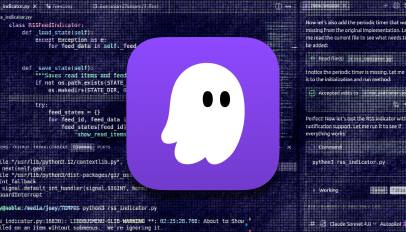Qilin continues to stake a claim as the top ransomware group in the wake of the decline of RansomHub earlier…
Usage tiers have been announced for Kiro, the ‘agentic’ AI IDE built on Code by a team at Amazon AWS…
Post Content Source: Read MoreÂ
Post Content Source: Read MoreÂ
Post Content Source: Read MoreÂ
Post Content Source: Read MoreÂ
Post Content Source: Read MoreÂ
The Calorie Burn Tracker is a web-based application designed to help users monitor, record, and analyze their daily calorie expenditure…
Google is testing new features in Chrome Canary to make it easier to manage tabs and use AI. These include…
Ever feel like your mouse is escaping to the wrong screen every single time? Or maybe your favorite app always…
Seeing “Your request has been blocked due to a network policy” on Reddit usually means Reddit’s security layer flagged your…
I“Please update your AMD Radeon driver” usually appears when a game or app detects an outdated or mismatched driver –…
Zebra ZD421 driver download on PC is straightforward if you use the official Windows driver and Zebra’s setup tools. Follow…
Color plays a pivotal role in crafting compelling user experiences and successful digital products. It’s far more than just aesthetics;…
Anthropic expands Claude Sonnet 4’s context window to 1M tokens With this larger context window, Claude can process codebases with…
CVE ID : CVE-2025-8342
Published : Aug. 15, 2025, 3:15 a.m. | 20 hours, 53 minutes ago
Description : The WooCommerce OTP Login With Phone Number, OTP Verification plugin for WordPress is vulnerable to authentication bypass due to insufficient empty value checking in the lwp_ajax_register function in all versions up to, and including, 1.8.47. This makes it possible for unauthenticated attackers to bypass OTP verification and gain administrative access to any user account with a configured phone number by exploiting improper Firebase API error handling when the Firebase API key is not configured.
Severity: 8.1 | HIGH
Visit the link for more details, such as CVSS details, affected products, timeline, and more…
CVE ID : CVE-2025-9006
Published : Aug. 15, 2025, 3:15 a.m. | 20 hours, 53 minutes ago
Description : A vulnerability was identified in Tenda CH22 1.0.0.1. Affected by this vulnerability is the function formdelFileName of the file /goform/delFileName. The manipulation leads to buffer overflow. The attack can be launched remotely. The exploit has been disclosed to the public and may be used.
Severity: 9.0 | HIGH
Visit the link for more details, such as CVSS details, affected products, timeline, and more…
CVE ID : CVE-2025-9007
Published : Aug. 15, 2025, 4:15 a.m. | 19 hours, 53 minutes ago
Description : A vulnerability has been found in Tenda CH22 1.0.0.1. Affected by this issue is the function formeditFileName of the file /goform/editFileName. The manipulation leads to buffer overflow. The attack may be launched remotely. The exploit has been disclosed to the public and may be used.
Severity: 9.0 | HIGH
Visit the link for more details, such as CVSS details, affected products, timeline, and more…
CVE ID : CVE-2025-6679
Published : Aug. 15, 2025, 7:15 a.m. | 16 hours, 53 minutes ago
Description : The Bit Form builder plugin for WordPress is vulnerable to arbitrary file uploads due to missing file type validation in all versions up to, and including, 2.20.4. This makes it possible for unauthenticated attackers to upload arbitrary files on the affected site’s server which may make remote code execution possible. For this to be exploitable, the PRO version needs to be installed and activated as well. Additionally a form with an advanced file upload element needs to be published.
Severity: 9.8 | CRITICAL
Visit the link for more details, such as CVSS details, affected products, timeline, and more…
CVE ID : CVE-2025-7778
Published : Aug. 15, 2025, 9:15 a.m. | 14 hours, 53 minutes ago
Description : The Icons Factory plugin for WordPress is vulnerable to Arbitrary File Deletion due to insufficient authorization and improper path validation within the delete_files() function in all versions up to, and including, 1.6.12. This makes it possible for unauthenticated attackers to to delete arbitrary files on the server, which can easily lead to remote code execution when the right file is deleted (such as wp-config.php).
Severity: 9.8 | CRITICAL
Visit the link for more details, such as CVSS details, affected products, timeline, and more…


